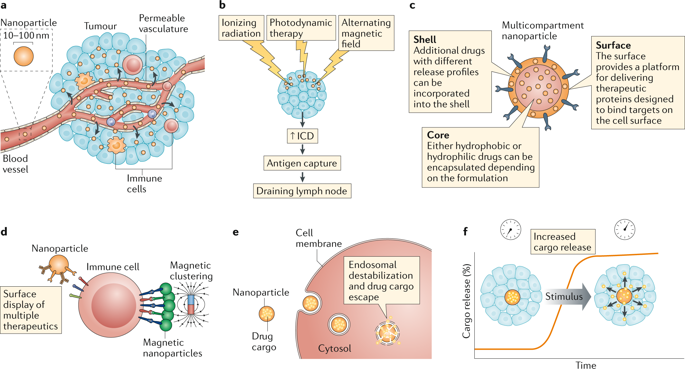当前位置:
X-MOL 学术
›
Nat. Rev. Immunol.
›
论文详情
Our official English website, www.x-mol.net, welcomes your
feedback! (Note: you will need to create a separate account there.)
Enhancing cancer immunotherapy with nanomedicine.
Nature Reviews Immunology ( IF 67.7 ) Pub Date : 2020-01-31 , DOI: 10.1038/s41577-019-0269-6 Darrell J Irvine 1, 2, 3, 4, 5 , Eric L Dane 1
Nature Reviews Immunology ( IF 67.7 ) Pub Date : 2020-01-31 , DOI: 10.1038/s41577-019-0269-6 Darrell J Irvine 1, 2, 3, 4, 5 , Eric L Dane 1
Affiliation

|
Therapeutic targeting of the immune system in cancer is now a clinical reality and marked successes have been achieved, most notably through the use of checkpoint blockade antibodies and chimeric antigen receptor T cell therapy. However, efforts to develop new immunotherapy agents or combination treatments to increase the proportion of patients who benefit have met with challenges of limited efficacy and/or significant toxicity. Nanomedicines - therapeutics composed of or formulated in carrier materials typically smaller than 100 nm - were originally developed to increase the uptake of chemotherapy agents by tumours and to reduce their off-target toxicity. Here, we discuss how nanomedicine-based treatment strategies are well suited to immunotherapy on the basis of nanomaterials' ability to direct immunomodulators to tumours and lymphoid organs, to alter the way biologics engage with target immune cells and to accumulate in myeloid cells in tumours and systemic compartments. We also discuss early efforts towards clinical translation of nanomedicine-based immunotherapy.
中文翻译:

用纳米药物增强癌症免疫治疗。
癌症免疫系统的治疗靶向现在已成为临床现实,并且已经取得了显著成功,最显着的是通过使用检查点封锁抗体和嵌合抗原受体T细胞疗法。然而,开发新的免疫疗法药物或联合治疗以增加受益患者比例的努力遇到了功效有限和/或毒性显着的挑战。纳米药物-由通常小于100 nm的载体材料组成或配制的治疗剂-最初是为了增加肿瘤对化疗药物的吸收并降低其脱靶毒性而开发的。在这里,我们将讨论基于纳米药物的治疗策略如何基于纳米材料将免疫调节剂引导至肿瘤和淋巴器官的能力而非常适合免疫疗法,改变生物制剂与靶免疫细胞结合的方式,并在肿瘤和全身性隔室的髓样细胞中积聚。我们还将讨论基于纳米医学的免疫疗法的临床翻译的早期工作。
更新日期:2020-01-31
中文翻译:

用纳米药物增强癌症免疫治疗。
癌症免疫系统的治疗靶向现在已成为临床现实,并且已经取得了显著成功,最显着的是通过使用检查点封锁抗体和嵌合抗原受体T细胞疗法。然而,开发新的免疫疗法药物或联合治疗以增加受益患者比例的努力遇到了功效有限和/或毒性显着的挑战。纳米药物-由通常小于100 nm的载体材料组成或配制的治疗剂-最初是为了增加肿瘤对化疗药物的吸收并降低其脱靶毒性而开发的。在这里,我们将讨论基于纳米药物的治疗策略如何基于纳米材料将免疫调节剂引导至肿瘤和淋巴器官的能力而非常适合免疫疗法,改变生物制剂与靶免疫细胞结合的方式,并在肿瘤和全身性隔室的髓样细胞中积聚。我们还将讨论基于纳米医学的免疫疗法的临床翻译的早期工作。











































 京公网安备 11010802027423号
京公网安备 11010802027423号